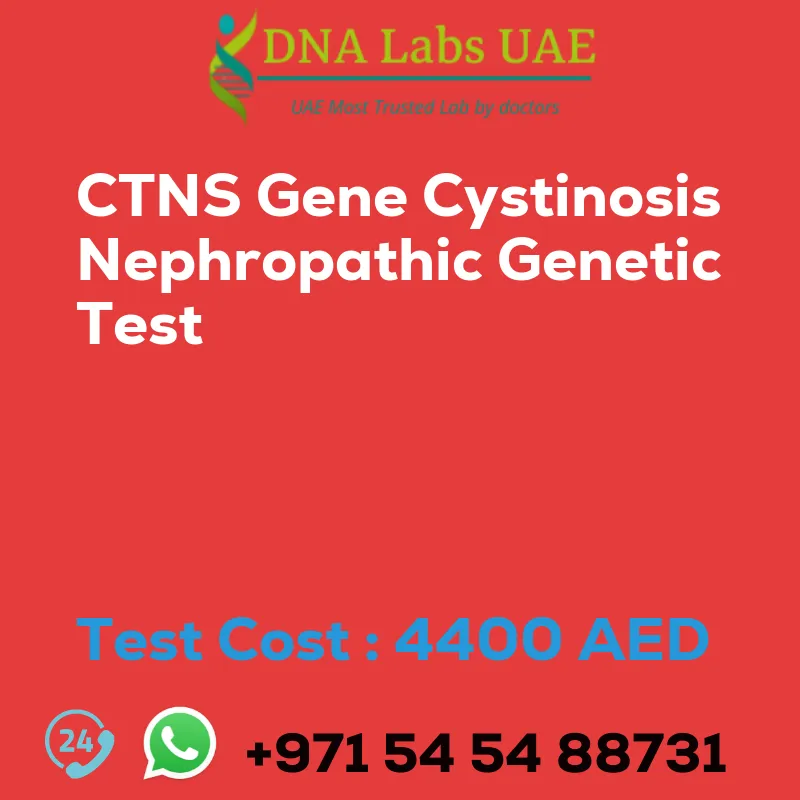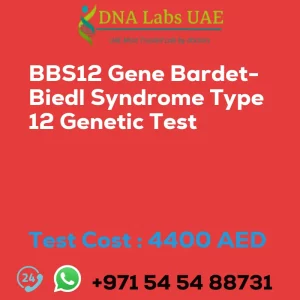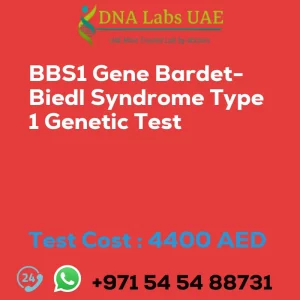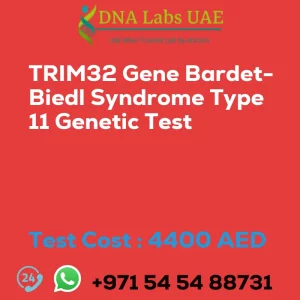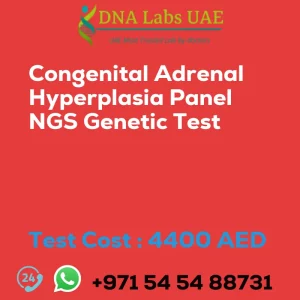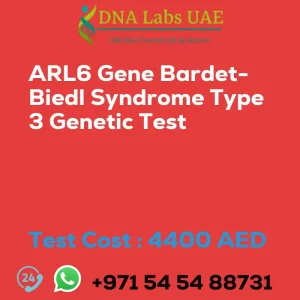CTNS Gene Cystinosis Nephropathic Genetic Test
At DNA Labs UAE, we offer the CTNS Gene Cystinosis Nephropathic Genetic Test. This test helps in diagnosing and understanding the genetic causes of cystinosis, a rare disorder affecting the transport of cystine in cells.
Test Components
- Price: 4400.0 AED
- Sample Condition: Blood or Extracted DNA or One drop Blood on FTA Card
- Report Delivery: 3 to 4 Weeks
- Method: NGS Technology
- Test Type: Hepatology Nephrology Endocrinology Disorders
- Doctor: General Physician
- Test Department: Genetics
Pre Test Information
Prior to undergoing the CTNS Gene Cystinosis Nephropathic Genetic Test, it is important to provide the clinical history of the patient. Additionally, a genetic counseling session is recommended to draw a pedigree chart of family members affected by the CTNS Gene Cystinosis Nephropathic Genetic Test gene CTNS.
Test Details
Cystinosis, nephropathic (CTNS gene) is a rare genetic disorder that affects the transport of the amino acid cystine out of the lysosomes in cells. This leads to the accumulation of cystine crystals in various organs and tissues, including the kidneys, eyes, liver, muscles, and brain.
NGS (Next-Generation Sequencing) genetic testing is a type of DNA sequencing technology that allows for the simultaneous analysis of multiple genes or the entire exome (all protein-coding regions of the genome). In the context of cystinosis, NGS genetic testing can be used to identify mutations or variants in the CTNS gene, which is responsible for this disorder.
By sequencing the CTNS gene, NGS testing can detect various types of genetic alterations, including point mutations, insertions, deletions, and rearrangements. This information can help in confirming a diagnosis of cystinosis and determining the specific genetic cause of the condition.
NGS genetic testing for cystinosis can be performed using a blood or saliva sample. The DNA is extracted from the sample and then sequenced using NGS technology. The resulting data is analyzed and compared to a reference genome to identify any variations in the CTNS gene.
The results of the NGS genetic test can provide valuable information for diagnosis, genetic counseling, and potential treatment options for individuals with cystinosis. It can help in determining the mode of inheritance, assessing the risk of passing the condition to future generations, and guiding personalized treatment plans.
It is important to note that NGS genetic testing is typically performed by specialized laboratories and requires a healthcare provider’s order. Genetic counseling is also recommended before and after the test to discuss the implications of the results and provide support for individuals and families affected by cystinosis.
| Test Name | CTNS Gene Cystinosis nephropathic Genetic Test |
|---|---|
| Components | |
| Price | 4400.0 AED |
| Sample Condition | Blood or Extracted DNA or One drop Blood on FTA Card |
| Report Delivery | 3 to 4 Weeks |
| Method | NGS Technology |
| Test type | Hepatology Nephrology Endocrinology Disorders |
| Doctor | General Physician |
| Test Department: | Genetics |
| Pre Test Information | Clinical History of Patient who is going for CTNS Gene Cystinosis, nephropathic NGS Genetic DNA Test. A Genetic Counselling session to draw a pedigree chart of family members affected with CTNS Gene Cystinosis, nephropathic NGS Genetic DNA Test gene CTNS |
| Test Details |
Cystinosis, nephropathic (CTNS gene) is a rare genetic disorder that affects the transport of the amino acid cystine out of the lysosomes in cells. This leads to the accumulation of cystine crystals in various organs and tissues, including the kidneys, eyes, liver, muscles, and brain. NGS (Next-Generation Sequencing) genetic testing is a type of DNA sequencing technology that allows for the simultaneous analysis of multiple genes or the entire exome (all protein-coding regions of the genome). In the context of cystinosis, NGS genetic testing can be used to identify mutations or variants in the CTNS gene, which is responsible for this disorder. By sequencing the CTNS gene, NGS testing can detect various types of genetic alterations, including point mutations, insertions, deletions, and rearrangements. This information can help in confirming a diagnosis of cystinosis and determining the specific genetic cause of the condition. NGS genetic testing for cystinosis can be performed using a blood or saliva sample. The DNA is extracted from the sample and then sequenced using NGS technology. The resulting data is analyzed and compared to a reference genome to identify any variations in the CTNS gene. The results of the NGS genetic test can provide valuable information for diagnosis, genetic counseling, and potential treatment options for individuals with cystinosis. It can help in determining the mode of inheritance, assessing the risk of passing the condition to future generations, and guiding personalized treatment plans. It is important to note that NGS genetic testing is typically performed by specialized laboratories and requires a healthcare provider’s order. Genetic counseling is also recommended before and after the test to discuss the implications of the results and provide support for individuals and families affected by cystinosis. |

